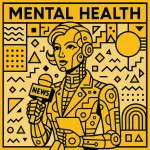Mental health concerns keep growing even as people talk about them more often. Schools, families, workplaces - everyone seems more aware these days. Despite all this attention, mental health problems hit record highs in 2024. American adults report feeling anxious or depressed three times more than they did in 2019. The number of people who think their mental health is excellent fell by 20% between 2004 and 2022. This trend makes experts wonder what drives this widespread decline when awareness has never been higher.
Social isolation plays a major role in this crisis. Our digital world lets people avoid real connections, creating an epidemic of loneliness. The COVID-19 pandemic made everything worse, cutting off normal social life almost overnight. During lockdowns, many people faced complete isolation, especially those living alone. Research clearly shows that a lack of human contact increases stress, depression, and anxiety rates. Even after restrictions ended, many struggled to rebuild relationships or create new ones. The aftermath continues as people find themselves disconnected from others.
Money worries fuel mental health struggles for millions. Rising costs, inflation, and economic uncertainty create constant pressure. Back in 2018, half of Americans already felt financially stressed. Fast forward to 2024, and a shocking 87% of people report experiencing money stress weekly. For college students, this financial pressure combines with academic demands, creating perfect conditions for mental health problems. As living expenses climb, mental well-being suffers, especially among young adults starting their careers or families. These money concerns affect almost every aspect of life.
Burnout has become almost normal in modern society. People work long hours without breaks, often at multiple jobs. This always-on lifestyle damages mental health across all industries. Healthcare workers show how bad things have become - nearly half reported burnout in 2022, up from 32% just four years earlier. Students face similar pressures. In Japan, famous for its demanding education system, student suicides more than doubled from 250 in 2018 to 514 in 2022. Our modern lifestyle keeps pushing people beyond their limits without allowing proper rest or recovery time.
Diet affects mental health more than most realize. Today, people eat more processed foods because they cost less than healthier options. Research links these dietary changes directly to mental health problems. Studies show that children who eat mostly processed foods develop more ADHD symptoms. Women carrying extra weight have a 38% higher chance of developing depression. Lower-income families often have little choice but to buy cheaper, processed foods. This creates a cycle where poor nutrition worsens mental health conditions already triggered by financial stress or isolation.
Mental health awareness itself might explain some of the statistical increase. As the stigma decreases, more people feel comfortable seeking help or discussing their struggles openly. Platforms like TikTok, which grew from $11 million in 2017 to over $4.8 billion today, give people space to share experiences and learn about mental health. Better education leads more people with symptoms to seek professional diagnosis. The rising numbers partly reflect a greater willingness to acknowledge problems that always existed but remained hidden. Simple steps like spending time with loved ones, managing finances carefully, eating well, and resting properly can help combat these growing challenges.
Social isolation plays a major role in this crisis. Our digital world lets people avoid real connections, creating an epidemic of loneliness. The COVID-19 pandemic made everything worse, cutting off normal social life almost overnight. During lockdowns, many people faced complete isolation, especially those living alone. Research clearly shows that a lack of human contact increases stress, depression, and anxiety rates. Even after restrictions ended, many struggled to rebuild relationships or create new ones. The aftermath continues as people find themselves disconnected from others.
Money worries fuel mental health struggles for millions. Rising costs, inflation, and economic uncertainty create constant pressure. Back in 2018, half of Americans already felt financially stressed. Fast forward to 2024, and a shocking 87% of people report experiencing money stress weekly. For college students, this financial pressure combines with academic demands, creating perfect conditions for mental health problems. As living expenses climb, mental well-being suffers, especially among young adults starting their careers or families. These money concerns affect almost every aspect of life.
Burnout has become almost normal in modern society. People work long hours without breaks, often at multiple jobs. This always-on lifestyle damages mental health across all industries. Healthcare workers show how bad things have become - nearly half reported burnout in 2022, up from 32% just four years earlier. Students face similar pressures. In Japan, famous for its demanding education system, student suicides more than doubled from 250 in 2018 to 514 in 2022. Our modern lifestyle keeps pushing people beyond their limits without allowing proper rest or recovery time.
Diet affects mental health more than most realize. Today, people eat more processed foods because they cost less than healthier options. Research links these dietary changes directly to mental health problems. Studies show that children who eat mostly processed foods develop more ADHD symptoms. Women carrying extra weight have a 38% higher chance of developing depression. Lower-income families often have little choice but to buy cheaper, processed foods. This creates a cycle where poor nutrition worsens mental health conditions already triggered by financial stress or isolation.
Mental health awareness itself might explain some of the statistical increase. As the stigma decreases, more people feel comfortable seeking help or discussing their struggles openly. Platforms like TikTok, which grew from $11 million in 2017 to over $4.8 billion today, give people space to share experiences and learn about mental health. Better education leads more people with symptoms to seek professional diagnosis. The rising numbers partly reflect a greater willingness to acknowledge problems that always existed but remained hidden. Simple steps like spending time with loved ones, managing finances carefully, eating well, and resting properly can help combat these growing challenges.












